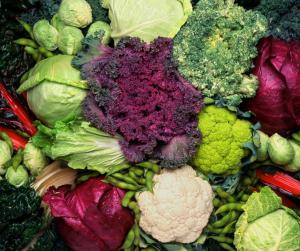By: Judy Davie - The Food Coach
 We all know fibre is great for digestion, but there's more to it than keeping things moving. New research is shining a light on how fibre-especially from whole, plant-based foods like fruit and vegetables-can support mental wellbeing too. We all know fibre is great for digestion, but there's more to it than keeping things moving. New research is shining a light on how fibre-especially from whole, plant-based foods like fruit and vegetables-can support mental wellbeing too.
With anxiety and depression on the rise, more people are reaching for fibre supplements. But the evidence is clear: when it comes to supporting your gut health and mood, fibre from real food is better than anything you'll find in a tub or capsule.
What is Fibre, and Why Does It Matter?
Fibre is the part of plant foods we can't fully digest. It plays a vital role in gut health by:
Feeding beneficial gut bacteria
Helping regulate blood sugar levels
Reducing inflammation
Supporting healthy bowel movements
There are two main types:
Soluble fibre: dissolves in water and helps feed good gut bugs (found in apples, pears, carrots, citrus, sweet potato, oats, legumes).
Insoluble fibre: bulks up waste and keeps things regular (found in wholegrain bread, broccoli, cauliflower, skins of fruit and veg).
Most whole plant foods-especially fresh produce-contain a mix of both.
The Gut-Brain Connection
Your gut is home to trillions of microbes (your gut microbiome) that talk directly to your brain. These microbes thrive on fibre, especially the kind found in a varied diet rich in fruit, vegetables, legumes, nuts, and wholegrains.
When they're well-fed, these microbes produce short-chain fatty acids that:
Protect the gut lining
Lower inflammation
Influence mood-boosting brain chemicals like serotonin
In fact, about 90% of the body's serotonin is made in the gut-not the brain! That's why what you eat can influence how you feel.
Fibre Supplements Fall Short
While many Australians fall short of the recommended 25-30g of fibre per day, the solution isn't necessarily in the supplement aisle. Research shows:
Fibre supplements don't provide the same mental health benefits as fibre from real food.
Most supplements contain just one type of fibre, missing out on the diversity found in fresh produce.
Whole foods offer more than fibre-they provide vitamins, minerals, antioxidants, and polyphenols that work together to support a healthy body and brain.
Plus, food is so much more enjoyable than a powder or pill.
Why Focus on Fruit and Vegetables?
Because they're some of the most powerful and accessible sources of fibre:
Berries, apples, pears, oranges, and kiwi fruit are rich in soluble fibre and antioxidants.
Leafy greens, broccoli, cauliflower, and Brussels sprouts are great for the gut and rich in insoluble fibre.
Carrots, sweet potatoes, parsnips, and beetroot are filling, colourful, and naturally high in fibre.
Even a humble banana can help nourish gut bacteria.
These foods are also anti-inflammatory, hydrating, and packed with nutrients your brain needs to function well.
Simple Ways to Boost Fibre
Add a grated apple or zucchini to porridge or muffins
Eat the skins of your fruit and veg when you can
Roast a tray of root vegetables and add them to salads or bowls
Snack on fresh fruit, veggie sticks, or a handful of raw nuts
Add chickpeas or lentils to soups, stews, or pasta sauces
Blend a smoothie with berries, spinach, banana, and chia seeds
Small shifts like these can help you reach your daily fibre target and nourish your gut in the process.
Final Thought
Fibre from fresh food doesn't just support good digestion-it supports a happier, healthier brain too. So next time you're at the market, load up on colourful fruit and veg. They're more than just side dishes-they could be part of your everyday mental wellness toolkit.
Comments
Be the first to comment!
|